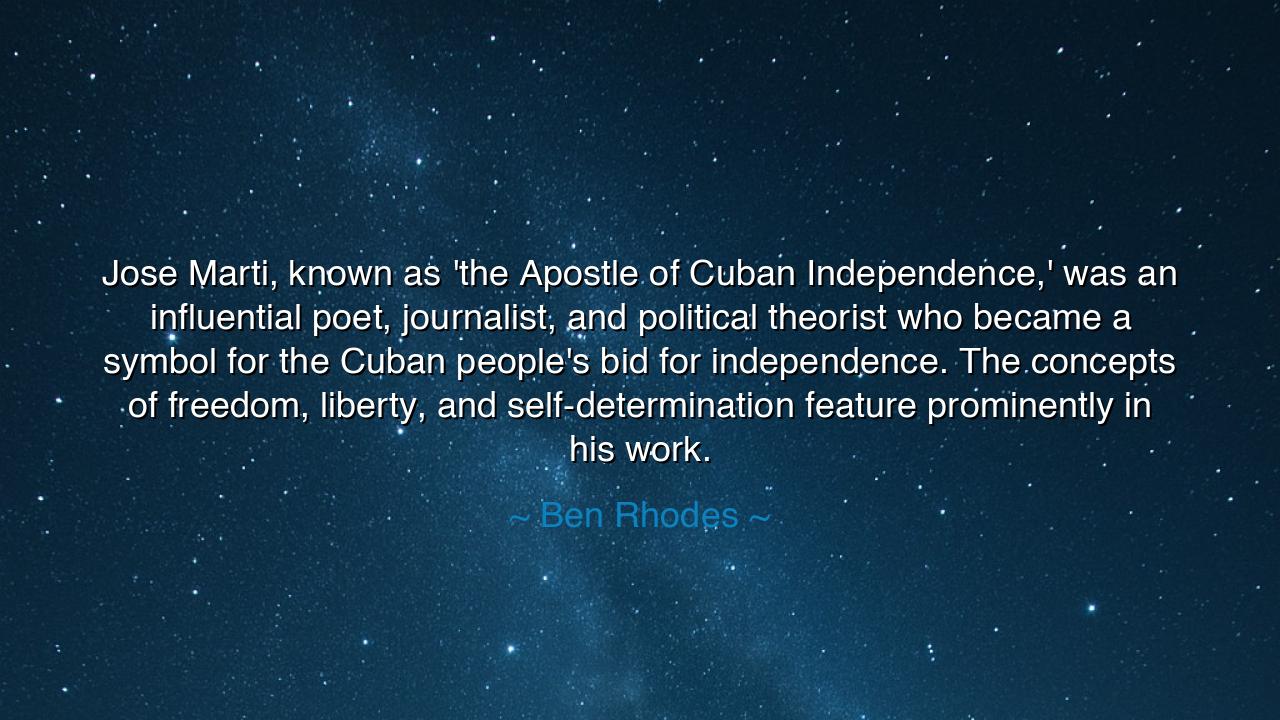
Jose Marti, known as 'the Apostle of Cuban Independence,' was an
Jose Marti, known as 'the Apostle of Cuban Independence,' was an influential poet, journalist, and political theorist who became a symbol for the Cuban people's bid for independence. The concepts of freedom, liberty, and self-determination feature prominently in his work.






“José Martí, known as ‘the Apostle of Cuban Independence,’ was an influential poet, journalist, and political theorist who became a symbol for the Cuban people's bid for independence. The concepts of freedom, liberty, and self-determination feature prominently in his work.” Thus spoke Ben Rhodes, reflecting on the life of one of the great souls of the nineteenth century — a man whose pen was sharper than any sword, and whose heart beat with the rhythm of an unchained nation. In these words lies the essence of Martí’s legacy, not only as a revolutionary for his homeland, but as a prophet of human dignity for all peoples. His life, like that of the great prophets of old, was short but blazing — a candle that burned itself away so that others might see the light of freedom.
To understand this quote, we must return to a time when Cuba lay under the heavy hand of Spanish colonial rule. For centuries, the island was a jewel in an empire’s crown, rich in sugar and blood, worked by enslaved hands, governed by foreign decrees. Into this world of oppression was born José Martí in 1853 — a child of Havana, who would grow into the voice of the voiceless. Exiled at sixteen for his political writings, he spent much of his life wandering the lands of exile — Spain, Mexico, Guatemala, and the United States — yet his heart never left the shores of his beloved Cuba. It was in exile that he sharpened his vision: that freedom is not granted by rulers, but claimed by the spirit; that liberty is not an act of rebellion, but the natural condition of the human soul.
Martí’s weapon was his word. He wrote not for scholars, but for the common people — for the farmer in the field, the laborer in the sugar mill, the mother teaching her child beneath the palm trees. In his poetry and essays, freedom is not a distant ideal, but a living flame, burning in every heart that refuses to bow. His words called not for hatred of Spain, but for love of Cuba — a love that could not exist while the nation was chained. He saw self-determination as the highest expression of moral maturity: the ability of a people to shape their own destiny, to govern not only their land but their conscience.
The ancients would have recognized Martí as one of their own — a philosopher-warrior, whose pen carried the same power as the oracles of old. Like Pericles, who told the Athenians that freedom demanded responsibility, Martí warned his people that independence without virtue would lead only to new forms of tyranny. “To be educated,” he wrote, “is the only way to be free.” He knew that a nation liberated by ignorance would soon fall prey to corruption, and that the true revolution begins not with the sword, but with the awakening of the mind. Thus, his concept of liberty was not merely political, but spiritual — a liberation of thought, of culture, of soul.
In the final act of his life, Martí took up arms not as a soldier of war, but as a servant of destiny. In 1895, he joined the Cuban War of Independence, despite warnings that his frail body and untrained hands would not survive the field. Yet he went willingly, for he believed that the poet who preaches freedom must be willing to die for it. His death, in the Battle of Dos Ríos, transformed him into what Rhodes calls “the Apostle” — a martyr whose sacrifice became the seed of a nation’s rebirth. Even his enemies could not deny his nobility; the Spanish general who oversaw his burial said, “We have killed a man, not a soldier.”
But Martí’s message was not meant for Cuba alone. His writings spoke of liberty as a universal bond, linking all peoples in their struggle against oppression. He saw the Americas not as divided nations, but as one vast family, betrayed by greed and saved only by mutual respect. His vision, like that of the prophets, reached beyond his own age. He warned against the rise of new empires — economic and cultural — that would seek to dominate smaller nations in the name of progress. To this day, his words resound with prophetic force: that true freedom can never coexist with exploitation, and that a people who forget their dignity will soon forget their destiny.
The lesson of Martí’s life, then, is clear and timeless: freedom must be both fought for and cultivated. It is not enough to overthrow tyranny; one must also guard against the tyranny within — the apathy, the ignorance, the complacency that erodes the soul of a nation. Each generation must become its own “Apostle of Independence,” carrying forward the torch that others once lit. For as Martí himself taught, “The task of every man is to make himself free.”
So, my child of the new world, remember the wisdom of José Martí and the reflection of Ben Rhodes: that freedom, liberty, and self-determination are not gifts given by the powerful, but inheritances of the human heart. Live with dignity, work with purpose, and think with courage. For nations, like souls, remain free only as long as their people love truth more than comfort, and justice more than ease. When you strive for this balance — when you live not as a subject but as a creator of your own fate — then, and only then, are you truly independent.






AAdministratorAdministrator
Welcome, honored guests. Please leave a comment, we will respond soon